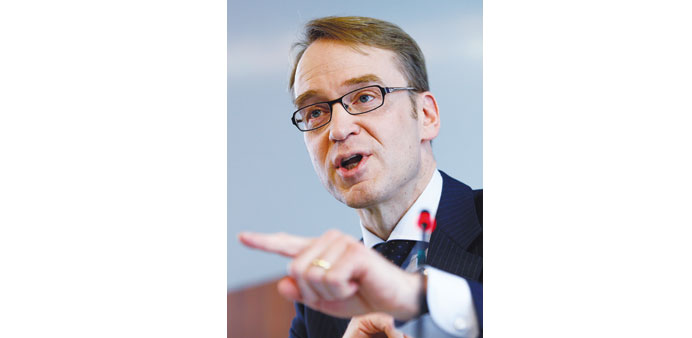Reuters/Frankfurt
The European Central Bank could buy loans and other assets from banks to help support the eurozone economy, Germany’s Bundesbank has said, marking a radical softening of its stance on the contested policy.
Jens Weidmann, who is a member of the European Central Bank’s Governing Council, told MNI in an interview published yesterday that the ECB could consider purchasing eurozone government bonds or top-rated private sector assets.
“Of course any private or public assets that we might buy would have to meet certain quality standards,” Weidmann said.
“But the overall question is one of effectiveness, costs and side-effects. We are currently discussing the effectiveness of these measures. The intended effects would then have to be weighed against the costs and side-effects.”
With little room for the ECB to cut interest rates further from a record low 0.25%, Weidmann called in the interview, which MNI said was conducted on Friday, for a debate about the effectiveness of other policy tools.
“The unconventional measures under consideration are largely uncharted territory. This means that we need a discussion about their effectiveness and also about their costs and side-effects,” he said.
The Bundesbank represents the 18-member eurozone’s biggest economy, Germany, and its president’s words carry weight in the debate over what the ECB should do as traditional tools such as changing borrowing costs lose their force.
He cited limits under the ECB’s mandate on funding eurozone governments, which a pending German constitutional court ruling on the legality of its Outright Monetary Transactions (OMT) bond purchase programme is expected to underline.
“This does not mean that a QE programme is generally out of the question. But we have to ensure that the prohibition of monetary financing is respected,” Weidmann said.
“We need to discuss this and ideally achieve a common view.”
Quantitative easing, or QE, is when a central bank buys loans or other assets from banks. It would represent a radical departure for the ECB, which has so far, not least because of resistance from Germany, refused to take such a step.
Weidmann has been one of the chief opponents of such a move and his change of tack signals a possible future shift in the ECB’s stance, just at the time that the US Federal Reserve is paring back its own programme of asset buying.
The ECB cut its benchmark interest rate to a record low of 0.25% in November and has said it will keep rates at this level or lower well into the recovery and even if inflation begins to pick up to absorb a large degree of unused capacity.
The central bank has started to pay closer attention to the euro exchange rate and its impact on the outlook for inflation, and Weidmann said a negative deposit rate could be a way to address the impact from a strengthening currency.
“If you wanted to counter the consequences of a strong appreciation of the euro for the inflation outlook, negative rates would, however, appear to be a more appropriate measure than others,” he said. “But we are talking about hypothetical scenarios here and not about imminent decisions.”
A negative deposit rate would mean that banks have to pay to park their funds at the ECB overnight.
The impact such a step would have to improve bank lending to companies and households is “debatable”, Weidmann said.
Weidmann’s predecessor Axel Weber resigned in 2011 in protest at the ECB’s first government bond purchase programme at the height of the euro zone debt crisis and Weidmann was the only Governing Council member to vote against the OMT in 2012.
The Bundesbank is concerned about overstretching the ECB’s mandate of preserving price stability and venturing too far into the realm of financing governments by buying sovereign debt, something that it is banned from doing under EU law. “It should be clear that my personal assessment will be a strict one. Buying not just peripheral bonds but German and French ones as well does not automatically solve the problem of monetary financing,” Weidmann said.
“One key aspect we need to consider is that of the redistribution of risks between member states.
“This issue persists even when buying bonds according to the capital key of the ECB because of the different risks of the respective sovereigns,” he said. “Ultimately, the risk to taxpayers would be tantamount to that of a euro bond issue.”
The capital key is the proportion of the ECB’s total capital paid in by member countries, of which Germany’s share is the largest at about 27%.
The Bundesbank has long opposed the pooling of liabilities, for example through jointly-issued bonds in the eurozone, without closer fiscal integration including common control over member states’ budgets.

